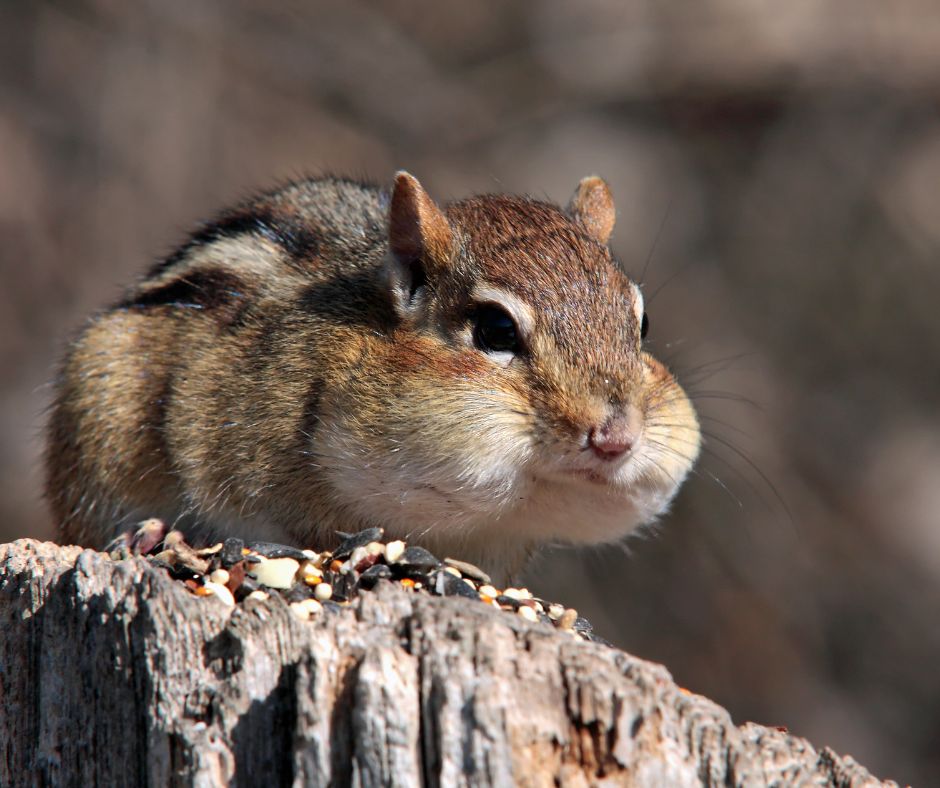 How To Get Rid of Chipmunks
How To Get Rid of Chipmunks
How To Get Rid of Chipmunks
Chipmunks are a very common nuisance wildlife in the Westchester, NY area. Chipmunks are small, reddish brown rodents with black and white vertical stripes on their backs. Chipmunks can be roughly 8-10 inches long, and weigh between 2 to 5 ounces. Chipmunks are known for wreaking havoc inside yards and gardens, as they eat flower bulbs and the roots, seeds, and seedlings of your vegetables. Chipmunks are also proficient diggers, and they will cause structural damage by digging underneath patios, porches, retaining walls, or even your home’s foundation.
Don’t worry, Westchester Wildlife can help. Our team of wildlife control operators can trap and remove chipmunk populations from your home, and we can also provide you with exclusions and seal outs to keep these pesky rodents from coming back. If you need chipmunk removal services, contact the experts at Westchester Wildlife today to get started at (914) 760-5713!
Chipmunk Garden Damage
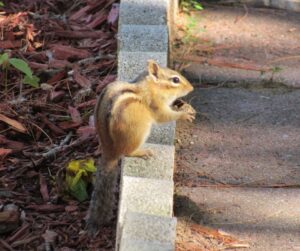 Chipmunks are omnivores that feed on seeds, nuts, berries, mushrooms, insects, worms, snails, bird eggs, frogs, fruits, and flowers. Whether you are growing flowers or vegetables, no garden is safe from the damage that chipmunks will inflict on it. Chipmunks will feast on the bulbs of flowers, and they will also happily eat roots, seeds, and seedlings of all your garden plants, which can disrupt their growth and lead to the death of the plant. If you are growing plants that bear fruits or nuts, chipmunks will steal and devour them. A group of chipmunks can decimate your garden seemingly overnight. Putting repellents on your plants might help, but never put repellents on plants made for human consumption.
Chipmunks are omnivores that feed on seeds, nuts, berries, mushrooms, insects, worms, snails, bird eggs, frogs, fruits, and flowers. Whether you are growing flowers or vegetables, no garden is safe from the damage that chipmunks will inflict on it. Chipmunks will feast on the bulbs of flowers, and they will also happily eat roots, seeds, and seedlings of all your garden plants, which can disrupt their growth and lead to the death of the plant. If you are growing plants that bear fruits or nuts, chipmunks will steal and devour them. A group of chipmunks can decimate your garden seemingly overnight. Putting repellents on your plants might help, but never put repellents on plants made for human consumption.
The best way to deal with a chipmunk damaging your garden is to contact Westchester Wildlife for chipmunk trapping and removal services at (914) 760-5713!
Chipmunk Burrow Damage
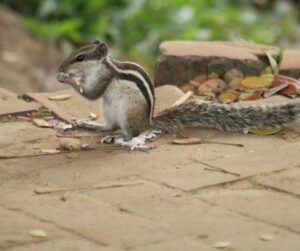 Garden plants aren’t the only thing at risk from chipmunks. Chipmunks excavate large burrows that can be 30 feet long and 3 feet deep. Chipmunk burrows have separate chambers for sleeping and storage of nuts and seeds, and the entrance holes to these burrows are around 2 inches in diameter. Chipmunks will dig their burrows underneath crucial structures on your property like patios, porch stairs and retaining walls, which can undermine the structural integrity and pose a major safety hazard. Chipmunk burrows can lead to these structures sinking into the ground, and they can also lead to people tripping in your yard.
Garden plants aren’t the only thing at risk from chipmunks. Chipmunks excavate large burrows that can be 30 feet long and 3 feet deep. Chipmunk burrows have separate chambers for sleeping and storage of nuts and seeds, and the entrance holes to these burrows are around 2 inches in diameter. Chipmunks will dig their burrows underneath crucial structures on your property like patios, porch stairs and retaining walls, which can undermine the structural integrity and pose a major safety hazard. Chipmunk burrows can lead to these structures sinking into the ground, and they can also lead to people tripping in your yard.
Chipmunks can even dig burrows underneath your home’s foundation, which can lead to the foundation cracking and settling, which can lead to water infiltration, leaks, and other problems inside the home.
Diseases Spread by Chipmunks
Chipmunks carry several diseases including
Chipmunks can also carry parasites like ticks and fleas, which spread their own diseases like Lyme Disease and Rocky Mountain Spotted Fever.
Chipmunk Exclusion and Habitat Modification
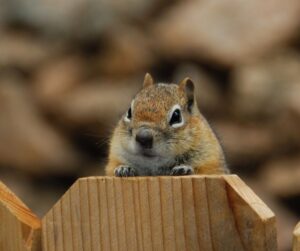 Chipmunk exclusion can help prevent these rodents from getting inside your garden or underneath your porch, patio, or foundation. Westchester Wildlife can provide you with mesh wildlife barriers/wildlife fencing around the perimeter of your garden, buried deep in the ground to prevent chipmunks from burrowing underneath it. Our team will also provide you with wildlife barriers around your patio, foundation, and porch to prevent chipmunk burrows from causing structural damage to your home.
Chipmunk exclusion can help prevent these rodents from getting inside your garden or underneath your porch, patio, or foundation. Westchester Wildlife can provide you with mesh wildlife barriers/wildlife fencing around the perimeter of your garden, buried deep in the ground to prevent chipmunks from burrowing underneath it. Our team will also provide you with wildlife barriers around your patio, foundation, and porch to prevent chipmunk burrows from causing structural damage to your home.
Habitat modification can also help prevent chipmunk issues. Remove wood piles, rock piles, and any debris from your foundation, as these provide chipmunks with cover from predators. Plants, tall grass, shrubs, and weeds around the perimeter of your foundation also make chipmunks feel safer in this area of your yard, and removing them will make them move on fairly quickly.
Chipmunk Trapping and Removal Near Me
Another way to deal with chipmunks on your property is to have them trapped and removed by licensed wildlife control operators like Westchester Wildlife. We have been dealing with chipmunks in the Westchester area for years, and we know their patterns and their behavior well. We can quickly and safely trap these troublesome rodents, and then remove them from your property, providing you with peace of mind. Chipmunks themselves are food for other nuisance wildlife like snakes, so removing chipmunks can help deter their predators too. If you need chipmunk trapping and removal services in the Westchester, NY area, contact the wildlife removal experts at Westchester Wildlife today at (914) 760-5713!
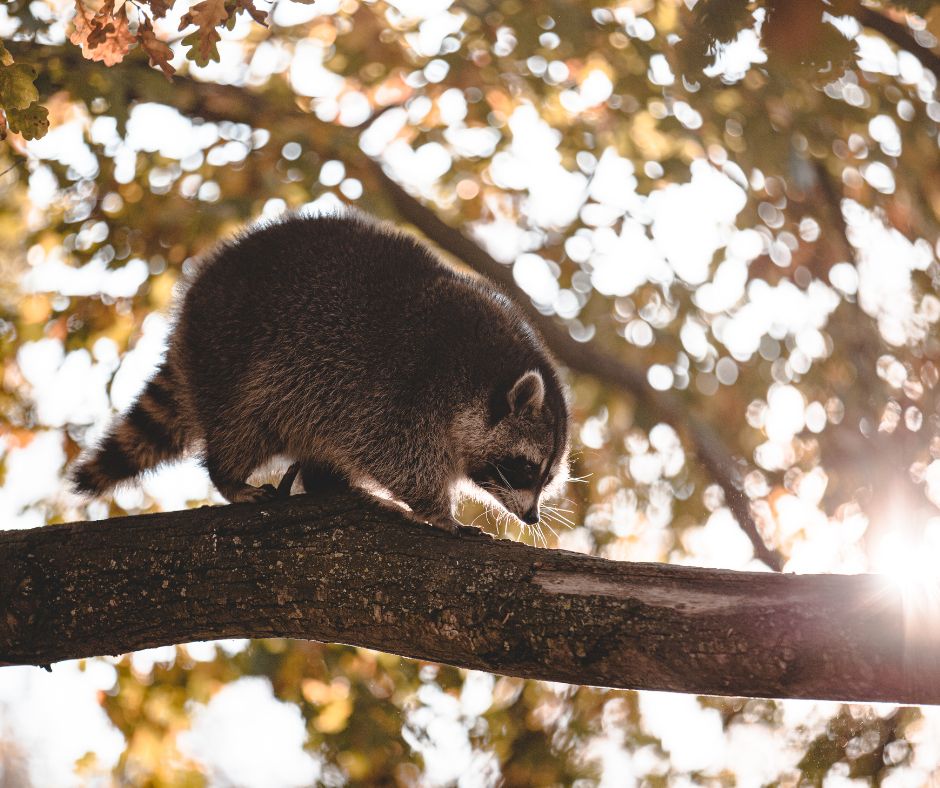 How To Identify Raccoon Infestations In Your Home
How To Identify Raccoon Infestations In Your Home
How To Identify Raccoon Infestations In Your Home
Do you have raccoons causing issues on your property? Raccoons will knock over and raid your trash cans, rip up your lawn, tear off roof shingles, get inside attics, and soil your insulation. Removing raccoons as soon as possible is imperative to limit the damage they can do to your property. Still, the first step of that is making sure it IS raccoons causing these issues and not another nuisance wildlife. Identifying the animal inside your attic or garage is crucial for safe and effective removal, so if you aren’t sure what critter has invaded your home, this blog can be your guide.
Physical Signs of Raccoons
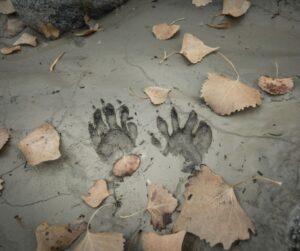 Raccoons are not graceful, and they will leave a path of destruction behind when they make their way inside your home. Raccoons love to nest inside attics, and they have no problem tearing through your soffit, eaves, and roof shingles to get inside. Squirrels and raccoons both claw and gnaw at tiny holes in your roof until they are wide enough to fit through, but a raccoon hole will be much larger than a squirrel hole.
Raccoons are not graceful, and they will leave a path of destruction behind when they make their way inside your home. Raccoons love to nest inside attics, and they have no problem tearing through your soffit, eaves, and roof shingles to get inside. Squirrels and raccoons both claw and gnaw at tiny holes in your roof until they are wide enough to fit through, but a raccoon hole will be much larger than a squirrel hole.
Raccoons are known for tipping over trash cans to feast on the garbage and food scraps left inside. If you go out to your garage or front yard and see the cans tipped over and garbage strewn about, this is a clear sign that you’ve been raided by a raccoon. Raccoons dig “latrines” which are communal defecating sites. When they dig latrines inside your attic insulation, you will be able to smell their pungent odor coming from inside your attic, which is another indicator of raccoons. However, these critters will also dig their latrines at the base of trees and underneath decks and porches. Raccoon feces are dark, tubular, and about 2-3 inches long. You can also identify raccoons by their tracks, which can be left in mud, dust, or after they step through water. Their front paws resemble small human hands with long claws, and their back paws are a similar shape, but with an elongated heel.
Raccoon Sounds
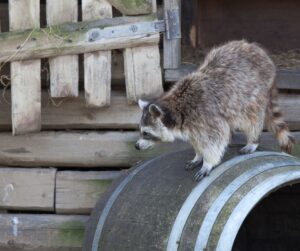 One of the easiest ways to identify a raccoon infestation inside your attic is to listen for the sounds they make. Birds and bats will make flapping and chirping sounds, while squirrels may make scampering or scratching sounds. Raccoons will loudly shuffle throughout your attic, creating loud stomping sounds that you might even mistake for human footsteps. Raccoons will also make scratching sounds, as well as ripping sounds as they rip up your attic insulation, and you might hear them knock over your trash can and throw the contents around.
One of the easiest ways to identify a raccoon infestation inside your attic is to listen for the sounds they make. Birds and bats will make flapping and chirping sounds, while squirrels may make scampering or scratching sounds. Raccoons will loudly shuffle throughout your attic, creating loud stomping sounds that you might even mistake for human footsteps. Raccoons will also make scratching sounds, as well as ripping sounds as they rip up your attic insulation, and you might hear them knock over your trash can and throw the contents around.
Raccoons also have a wide arsenal of vocal sounds. You might hear raccoons inside your attic chittering, growling, screaming, hissing, snarling, whimpering, or even purring. Raccoons can become aggressive when confronted, and they often carry rabies, so leave raccoon removal to the professionals.
Raccoon Removal in Westchester County
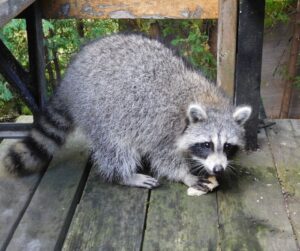 If you have identified a raccoon inside your garage, attic, or crawl space, don’t panic! Getting raccoons off your property can be quick and easy if you know who to call. Attempting to remove raccoons yourself isn’t a good idea, as these animals will often become extremely hostile, lashing out with their sharp teeth and claws, and they can also spread rabies through their bites. Raccoons also hide their babies deep within your attic insulation, and if you don’t find and remove all of them, the mother raccoon will rip the shingles off your roof to get back inside and retrieve her baby.
If you have identified a raccoon inside your garage, attic, or crawl space, don’t panic! Getting raccoons off your property can be quick and easy if you know who to call. Attempting to remove raccoons yourself isn’t a good idea, as these animals will often become extremely hostile, lashing out with their sharp teeth and claws, and they can also spread rabies through their bites. Raccoons also hide their babies deep within your attic insulation, and if you don’t find and remove all of them, the mother raccoon will rip the shingles off your roof to get back inside and retrieve her baby.
Local animal control also will not come remove raccoons that have set up shop in your attic, as they only handle domestic animals like cats and dogs, or wildlife that has gotten onto public property, like a road or park. A licensed wildlife removal company like Westchester Wildlife is your best bet for raccoon removal. We can safely and humanely trap and remove any raccoon that has set up shop in your attic, crawl space, or yard, and we will ensure that we remove all the babies, preventing the mother from returning. Contact us today to get started at (914) 760-5713!
Raccoon Deterrents and Prevention
An important aspect of raccoon removal is utilizing deterrents and preventative measures to keep the raccoons from coming back. To prevent raccoons, you should tightly secure your garbage can lids, and always bring bowls of pet food inside before bed. Getting rid of bird baths and other sources of water on your property can also encourage them not to stay.
Westchester Wildlife also offers raccoon deterrents. After removing the raccoon, we will seal and fortify all the raccoon’s entry points and any potential future entry points, preventing these critters from breaking their way inside your attic again.
Best Raccoon Trapping Near Me
You can easily identify raccoon infestations through visual cues like knocked-over trash cans, latrines, footprints, and large entry holes, or through sounds like stomping, scratching, growling, snarling, or whimpering. Once you’ve identified a raccoon infestation, contact the experts at Westchester Wildlife for raccoon trapping and removal services. We can ensure the raccoon and all raccoon babies are safely and humanely removed from your property. Westchester Wildlife also offers seal-outs and exclusions to deter raccoons from returning. Contact us today to get started with a FREE estimate at (914) 760-5713!
